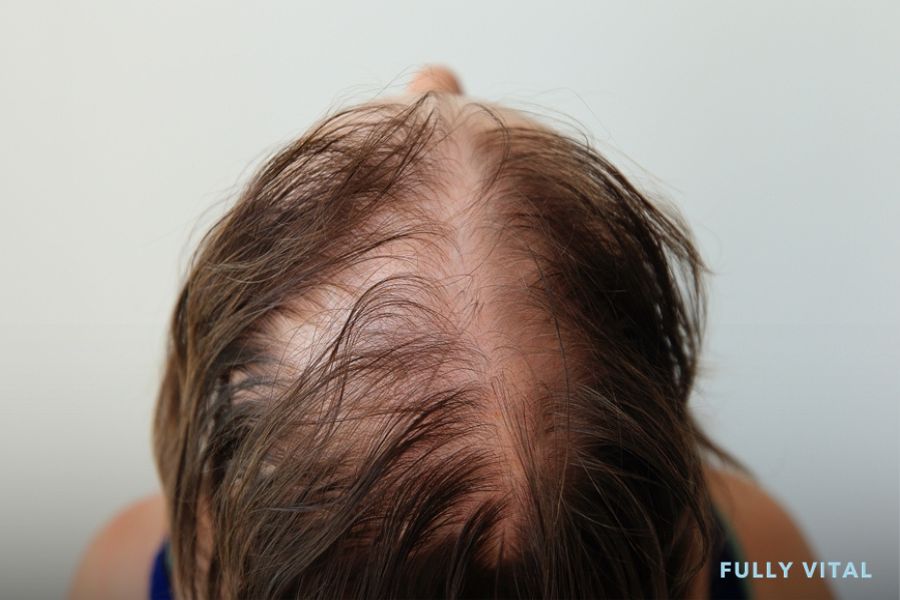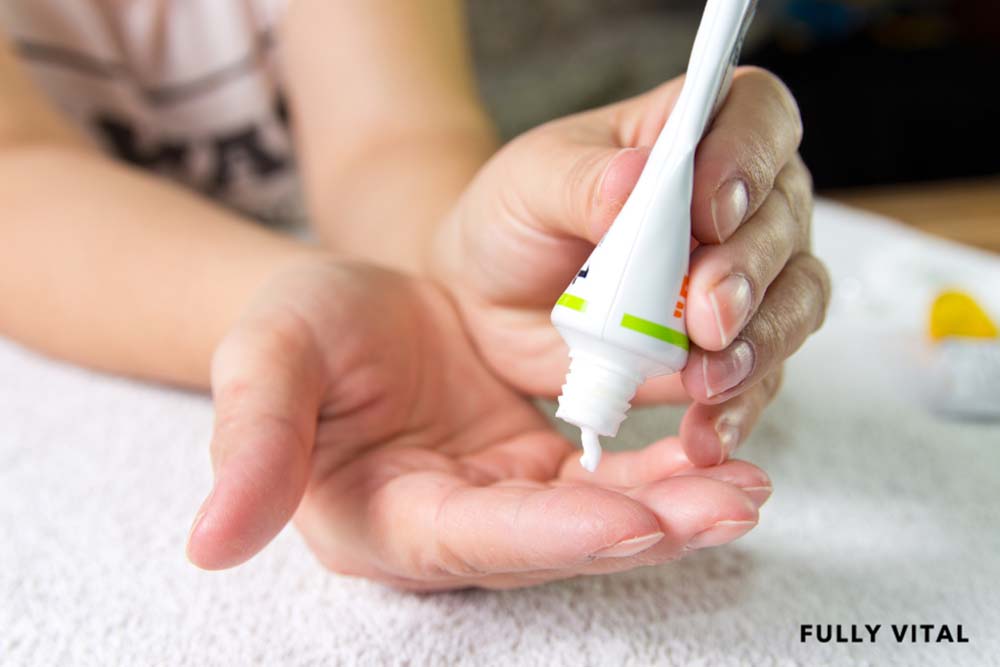
Anagen Effluvium: Understanding Hair Loss And Solutions
Welcome to our comprehensive guide on anagen effluvium, a common concern for women of all hair types who are seeking ways to stimulate hair growth.
In this article, we'll delve into the details of anagen effluvium, why it's essential to comprehend, how it develops, its benefits, potential downsides, and alternative treatments.
Let's get started!

I LOVE MY HAIR NOW
FullyVital hair serum and hair vitamins made tremendous improvements in my hair. I truly love my hair now.
Dorit S.,
What Is Anagen Effluvium?
Anagen effluvium is a term used to describe the sudden and widespread hair loss that occurs during the anagen phase of the hair growth cycle.
This phase is when hair is actively growing, and anagen effluvium can result in significant hair thinning or bald patches.(1)
Why Is Understanding Anagen Effluvium Important?
Understanding anagen effluvium is crucial because it helps individuals recognize the underlying causes of their hair loss.
Whether it's due to chemotherapy, radiation therapy, or other triggers, knowing the root cause can guide you toward the right solutions for managing and potentially reversing the condition.
How Does Anagen Effluvium Develop?
Anagen effluvium typically develops as a result of factors that disrupt the normal growth cycle of hair follicles. These disruptors can include:
Chemotherapy
Cancer treatments often target rapidly dividing cells, which can affect hair follicles in the anagen phase.
Radiation Therapy
Similar to chemotherapy, radiation therapy can damage hair follicles and lead to hair loss.
Toxic Chemical Exposure
Exposure to certain chemicals or toxins can trigger anagen effluvium.
Nutritional Deficiencies
Inadequate nutrition, especially protein and iron, can contribute to hair loss.
What Are the Benefits Of Managing Anagen Effluvium?
When it comes to anagen effluvium, a condition characterized by sudden and widespread hair loss during the active growth phase of hair follicles, effective management can yield a range of noteworthy advantages.
These benefits encompass not only the physical aspects but also the emotional well-being of individuals dealing with this challenging condition.
- Preserving Hair: One of the primary benefits of managing anagen effluvium is the preservation of existing hair. Through timely and appropriate interventions, individuals can halt the progression of hair loss, preventing further thinning or balding. This preservation of hair can be particularly crucial for those who cherish their locks and wish to maintain their current appearance.
- Boosting Confidence: Hair is often regarded as a symbol of vitality and attractiveness, and its loss can lead to emotional distress. Effective management of anagen effluvium, whether through medical treatments or lifestyle adjustments, can help individuals feel more confident in their appearance and boost their self-assurance.
- Enhancing Quality of Life: Hair loss, especially when it occurs suddenly and dramatically, can significantly affect an individual's quality of life. Managing anagen effluvium can reduce the distress associated with hair loss, leading to an improvement in overall well-being. By addressing the underlying causes and seeking appropriate solutions, individuals can navigate this challenging period with greater ease and comfort.
Are There Any Downsides To Anagen Effluvium?
While anagen effluvium is often a side effect of necessary medical treatments, it can still be emotionally challenging.
Some downsides to consider include:
- Temporary Hair Loss: Hair loss during anagen effluvium is usually temporary but can be distressing.
- Emotional Impact: Coping with hair loss can be emotionally taxing for many individuals.
- Need for Support: Patients may require support from loved ones or mental health professionals to cope effectively.
What Are The Alternative Treatments To Anagen Effluvium?
Several alternative treatments and strategies can help manage anagen effluvium, such as:
- Scalp Cooling: Using cold caps during chemotherapy to reduce hair loss.
- Nutritional Supplements: Incorporating supplements like biotin, iron, and zinc into your diet.
- Topical Hair Growth Products: Exploring topical treatments that promote hair growth.
- Wigs and Hairpieces: Considering wigs, hairpieces, or scarves for temporary coverage.
What Does Anagen Effluvium Hair Look Like?
Anagen effluvium hair typically exhibits distinct characteristics that can help identify the condition:
Thinning
Hair becomes noticeably thinner due to the increased shedding of anagen-phase hairs.
Brittleness
Anagen effluvium hair may appear more fragile and prone to breakage.2
Uneven Growth
Hair growth can become irregular, leading to uneven lengths and patches of thinning.
How Is The Hair Pull Test Used To Test For Anagen Effluvium?
The hair pull test is a simple diagnostic method to assess the presence of anagen effluvium.
Here's how it's done:
- Grab a small section: Take a small section of hair between your fingers.
- Gently pull: Apply gentle but steady traction to the hair.
- Observe: If more than a few hairs come out easily, it may indicate anagen effluvium.
What Are the Different Types of Anagen Effluvium?
There are several types of anagen effluvium, each with its own causes and characteristics:
Chemotherapy-Induced Anagen Effluvium
Triggered by chemotherapy drugs and leads to widespread hair loss.(3)
Radiation-Induced Anagen Effluvium
Occurs due to radiation therapy, often localized to the treatment area.
Toxin-Induced Anagen Effluvium
Caused by exposure to toxic substances, such as heavy metals or chemicals.
Nutritional Anagen Effluvium
Resulting from severe nutritional deficiencies, particularly protein and iron.
Is Anagen Effluvium Curable?
Anagen effluvium, a condition marked by abrupt hair loss during the hair follicles' active growth phase, is typically considered a reversible condition.
Its curability hinges on effectively identifying and addressing the underlying cause.
Once the precipitating factor, whether it's chemotherapy, radiation therapy, exposure to toxins, or nutritional deficiencies, is managed or eliminated, the hair follicles can gradually return to their normal growth cycle.
Hair regrowth generally initiates within several months following this resolution.(4)
However, it's important to recognize that the duration of recovery varies significantly among individuals, influenced by factors such as genetic predisposition, overall health, the specific cause of anagen effluvium, and the effectiveness of the chosen treatment or intervention.
In cases linked to chemotherapy or radiation therapy, hair may commence regrowth within a few weeks to months after treatment completion.
For individuals grappling with toxin-induced anagen effluvium, recovery may necessitate several months following the cessation of toxin exposure.
Similarly, those with nutritional anagen effluvium often experience hair regrowth within a few months after improving their dietary and nutritional status.
Anagen effluvium is generally a curable condition, offering optimism to those contending with hair loss that their hair can rejuvenate with appropriate interventions and time, though the pace of recovery can be variable.
How Long Does It Take for Anagen Effluvium to Go Away?
The timeline for anagen effluvium recovery depends on various factors, including the cause and individual characteristics.
Here's a general guideline:
- Chemotherapy-Induced: Hair often starts to grow back a few weeks to a few months after completing chemotherapy.
- Radiation-Induced: Hair regrowth may begin within a few weeks to months after radiation therapy ends.
- Toxin-Induced: Once the exposure to toxins ceases, hair recovery can take several months.
- Nutritional: Improvements in diet and nutritional status can lead to hair regrowth within a few months.
Unlock The Secret To Youthful Hair With Fully Vital!Experience the transformative power of science-backed hair growth products designed to slow down and reverse the aging of your hair. At Fully Vital, we're dedicated to helping you foster a healthier relationship with your locks. Key Features:
Discover the Fully Vital difference today and embark on a journey to reinvigorate your hair's natural beauty! |
Final Thoughts On Anagen Effluvium
Understanding anagen effluvium is paramount for anyone experiencing hair loss during medical treatments or due to specific triggers.
We've explored its causes, effects, and available treatments, highlighting its importance in the context of hair health.
At Fully Vital, we are committed to helping you maintain a healthy relationship with your locks.
Our range of hair growth products is designed to address various hair concerns, including those related to anagen effluvium.
Whether you're looking to prevent hair loss or promote regrowth, our products offer effective solutions to support your journey towards healthier, more vibrant hair.
Remember, your hair deserves the care and attention it needs.
Explore our hair growth products to nourish your locks and embrace the confidence that comes with a fuller, healthier head of hair.
Your hair's future is in your hands, and Fully Vital is here to help you make the most of it.
Frequently Asked Questions About Anagen Effluvium
Can anagen effluvium lead to permanent hair loss?
Anagen effluvium typically results in temporary hair loss, and hair often regrows once the underlying cause is addressed.
However, in some cases, prolonged or severe damage to hair follicles can lead to permanent hair loss.
Is anagen effluvium permanent?
No, anagen effluvium is typically temporary and reversible once the underlying cause is addressed.
Can anagen effluvium be prevented?
While it may not always be preventable, certain strategies like scalp cooling during chemotherapy can help minimize hair loss.
How long does it take for hair to regrow after anagen effluvium?
Hair regrowth can vary from person to person, but it often begins within a few months after the triggering factor is removed.
Are there any natural remedies for anagen effluvium?
Some individuals explore natural remedies like essential oils and herbal supplements, but their effectiveness varies.
Can anagen effluvium affect all hair types?
Anagen effluvium can affect individuals of all hair types.
However, the impact and recovery may vary depending on factors such as the cause of anagen effluvium and individual genetics.
Can stress trigger anagen effluvium?
Yes, stress can contribute to anagen effluvium, especially in cases where stress leads to nutritional deficiencies or other factors that disrupt the hair growth cycle.
Managing stress through relaxation techniques and a healthy lifestyle may help prevent or mitigate hair loss.
Is anagen effluvium more common in women?
Anagen effluvium can affect both men and women, but it may be more common in women due to factors such as chemotherapy or hormonal changes.
The underlying cause determines its prevalence in different genders.
Does anagen effluvium always require medical treatment?
Not all cases of anagen effluvium require medical treatment. In some instances, such as nutritional deficiencies, improving dietary intake may be sufficient for hair regrowth.
However, consulting a healthcare provider is essential to determine the best course of action for each specific case.
Should I consult a healthcare professional for anagen effluvium?
Yes, consulting with a healthcare provider or dermatologist is essential for a proper diagnosis and personalized treatment plan.
Sources:
- Saleh, D., Nassereddin, A., & Cook, C. (2021). Anagen Effluvium. PubMed; StatPearls Publishing. https://www.ncbi.nlm.nih.gov/books/NBK482293/
- Anagen Effluvium: Background, Pathophysiology, Etiology. (2022). EMedicine. https://emedicine.medscape.com/article/1073488-overview
- Yun, S. J., & Kim, S.-J. (2007). Hair Loss Pattern due to Chemotherapy-Induced Anagen Effluvium: A Cross-Sectional Observation. Dermatology, 215(1), 36–40. https://doi.org/10.1159/000102031
- Kanwar, A. J., & Narang, T. (2013). Anagen effluvium. Indian Journal of Dermatology, Venereology and Leprology, 79(5), 604–612. https://doi.org/10.4103/0378-6323.116728






